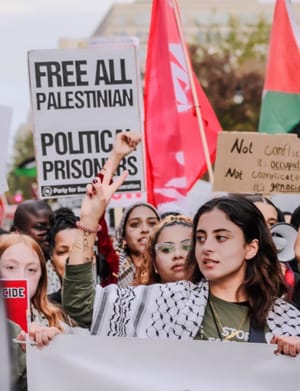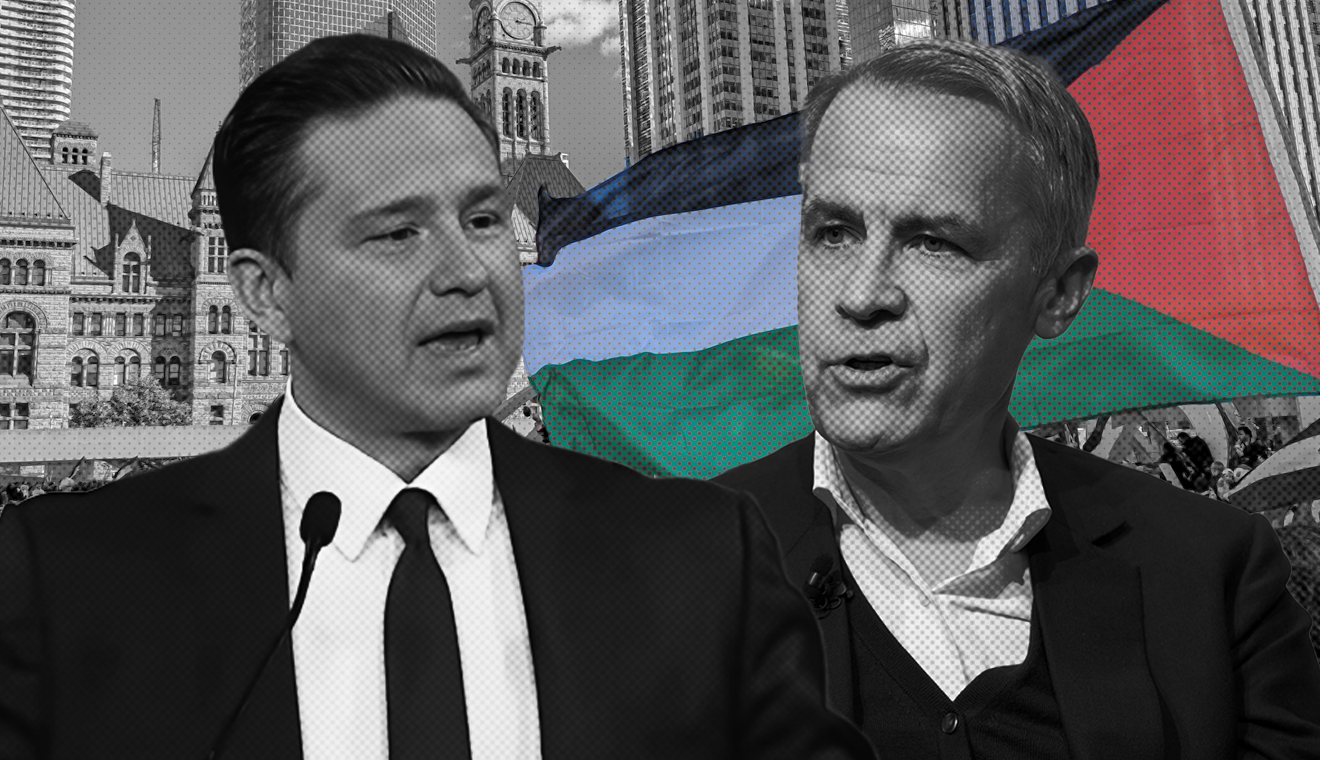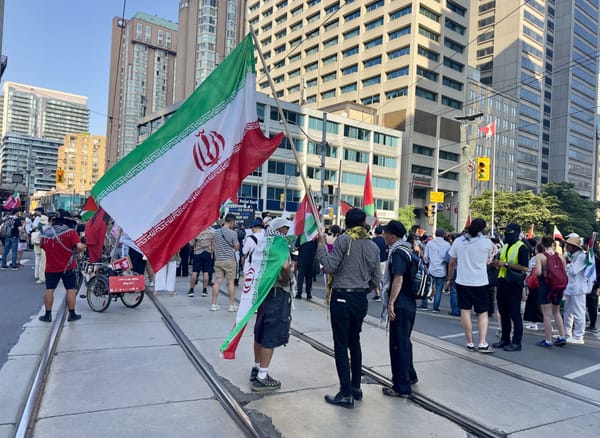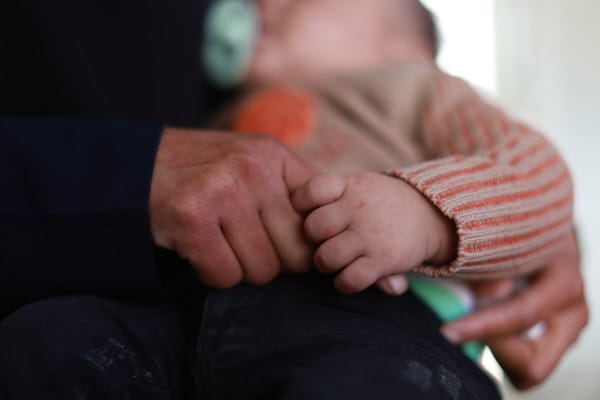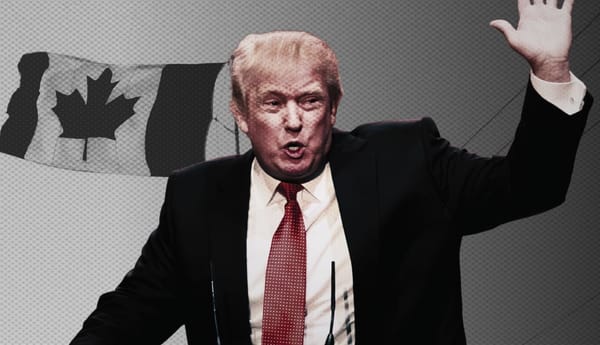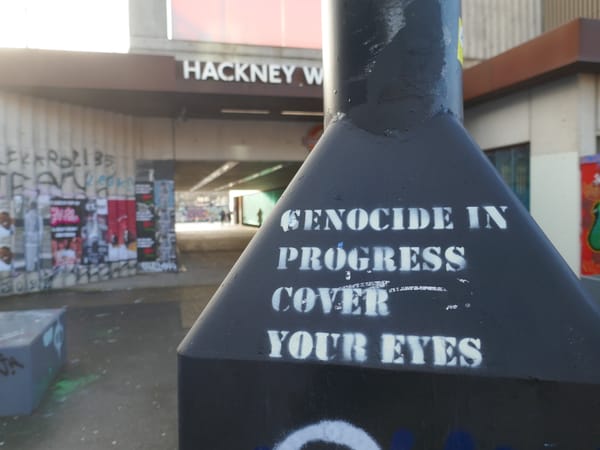I know many of you will be factoring Palestine into your decision on how to vote in the upcoming federal election.
With that in mind, it’s important to know where Canada’s major parties, particularly the Liberals and Conservatives, stand on Palestine in terms of their foreign policy and how they relate to the Palestine solidarity movement within Canada.
To get a better understanding of this issue, as well as what importance voting in Canada even has for Palestine, I reached out to several Palestinians and asked them if there is any meaningful difference between the Liberals and Conservatives.
Each writer was given 500 words to weigh in. Their responses were written before Israeli Prime Minister Benjamin Netanyahu attacked Prime Minister Mark Carney for seeming to acknowledge Israel’s genocide in Gaza (which he later made clear he did not intend to do).
Here is what the writers had to say. Let us know what you think, and make sure to vote at the end.
Also, as a 100 per cent reader-funded publication, this sort of work is only possible thanks to readers becoming members and making donations. If you haven’t done so yet, please consider changing that now.
Enjoy!
Tara Alami
Canada’s major political parties are committed to funding, arming and protecting the Zionist regime.
In terms of foreign policy on Palestine, the Liberals and Conservatives are effectively indistinguishable. Both intend on continuing to participate in the ethnic cleansing and occupation of Palestine, from Gaza to the West Bank. For example, the Liberal government brokered a $78.8 million deal in September 2024 to supply Zionist forces with artillery propellants. The Conservatives, meanwhile, have had no opposition to these sorts of arms sales. In addition, neither party has materially opposed or even rhetorically condemned the Jewish National Fund of Canada’s funding for settlements in the West Bank.
The NDP’s foreign policy, at face value, is relatively friendlier. The NDP has condemned the sale of arms to Israel, called for the “recognition of Palestinian statehood” and on Oct. 13, 2023, became the first major federal party to call for a ceasefire and the return of settler hostages. It also simultaneously condemned the total siege on Gaza and the October 7 operation that broke it.
The small but sometimes significant differences between Liberals and Conservatives are oftentimes related to the domestic repression of the Palestine movement, though both Liberal and Conservative MPs have propagated the October 7 mass rapes hoax, smeared protesters as antisemitic and dangerous, and accused the movement of “glorifying violence.”
The parties can be distinguished insofar as the way this repression of the movement is executed, not whether it will be. Both parties align on the core principle that rallies, campus organizing and any rhetorical or material support for absolute Palestinian freedom is hateful and antisemitic, but they diverge when it comes to the optics of how they wish to liquidate the movement.
In practice, whether at an accelerated pace or using polite language, neither party will end its material support for Zionist colonialism through foreign policy and domestic repression. To climb the ranks of Canadian politics, you must believe in Canada — an imperialist state built through land theft and dispossession — as a political project in and of itself, and, by extension, its closest colonial allies.
So, what does it mean to engage and organize around federal elections from within the heart of empire if outcomes seem predetermined and bleak?
First, doing so is an assertion of the movement’s popular presence, not only on the streets, but within many sites of struggle: education, labour unions, cultural institutions, the legal system, the charitable sector, and, necessarily, electoral politics. Second, doing so is an opportunity to map out sympathetic MPs and prepare for upcoming battles.
Freedom for Palestine will not be achieved in Canada’s Parliament or Senate, or through any election in North America. And yet, a diversity of tactics is necessary, especially when the state’s repression of the movement heightens.
Critical engagement with the ongoing election isn’t an expression of faith in an imperialist state apparatus. Rather, it’s a clarification of political red lines across all sites of struggle and a commitment to Palestinian liberation that transcends voting.
Tara Alami is a Palestinian organizer and writer from occupied Jerusalem and occupied Yafa.
Mohammed Alqasem
There will be no meaningful difference between the Liberals and Conservatives on Palestine. The two parties largely treat foreign policy in the same way, and as we’ve seen repeatedly, they will shift the country rightward on these issues.
Although the Liberals will try to appear more ‘diplomatic,’ they will continue to fail to reflect popular sentiment in the country, which is supportive of Palestinian liberation. The Tories, on the other hand, will be more explicit in their support for the Zionist project and the rejection of Palestinian sovereignty.
The Trudeau Liberals had an awful voting record on Palestine at the United Nations, largely continuing the Harper government’s legacy and regressing significantly from past Liberal governments. In 2011, Canada broke from tradition and voted against several resolutions it had previously supported (both under the Conservatives and Liberals), and abstained from another. These resolutions included: self-determination for Palestinians; condemnation of Zionist settlements; the applicability of the Geneva Convention to the occupation; the right of Palestinian refugees to their property; assistance to UNRWA; and the condemnation of the occupation of East Jerusalem. It took until 2019 for the Liberals to reverse course on even just one of these resolutions, and until 2024 to do so for several.
The Liberals could have supported recent rulings from the International Court of Justice and the International Criminal Court, and implemented a full two-way arms embargo, sanctions, and a more open policy to allow Gazan refugees to reunite with their families in Canada. But they did not, and as of January, just 616 Gazans had arrived in Canada under their policy. This is astonishing considering nearly 300,000 Ukrainians have been welcomed into Canada since the war with Russia began, which is a direct result of how much easier the government made it for them to come here.
The Conservatives, meanwhile, have also reacted abysmally to the ongoing genocide of Palestinians. Plus, if they do take power, they’ll likely expand on policies already put in place by the Liberals that will negatively impact Palestinians. For example, the major crackdown we’ve seen against the pro-Palestine movement thus far — which has included the adoption of the International Holocaust Remembrance Alliance’s definition of antisemitism and the abuse of laws to punish dissenters — happened under Trudeau’s Liberals. The Tories will double down on these policies to criminalize others in the movement.
I know many Palestinians, Arabs and Muslims who have completely lost hope in both parties, or even the electoral system altogether. They’re now unlikely to allow politicians from these parties into their midst, and certainly will not welcome them into their places of worship and homes.
They are right to feel this way. At this point, it would be dangerous to believe any federal government will take principled actions on Palestine without a real imposition of the will of Canadians to make them do so.
Mohammed Alqasem is a Palestinian community organizer, trade-unionist and writer, based in Toronto. Originally from Nablus, he has been active in the student and labour movements, as well as Arab community organizing.
Hammam Farah
Although the Liberals and Conservatives share a commitment to Israel based on mutual interests and the preservation of imperial power, the gap between them in this election isn’t one we can afford to overlook.
As prime minister, Mark Carney, the classic liberal that he is, has taken a more humanitarian approach than Justin Trudeau did, though still a cautious one, given the ongoing election.
In March, Carney’s government pledged nearly $100 million in humanitarian aid to Palestinians for food, health care, shelter and reconstruction. He has also urged Israel to restore electricity to Gaza, emphasizing the need to uphold international law.
Additionally, Carney has signalled support for Palestinian statehood, aligning Canada more closely with its long-stated policy and the ‘international consensus’ on the two-state solution. Though Carney’s government hasn’t officially recognized the State of Palestine, his language has offered reason for cautious optimism that had been sorely lacking under Trudeau — who recently declared himself a Zionist after materially supporting Israel’s genocide in Gaza.
In contrast to Carney, Conservative Party Leader Pierre Poilievre has been staunchly pro-Israel and pro-genocide, matching former prime minister Stepen Harper’s commitment to the state.
Poilievre has pledged to move Canada’s embassy from Tel Aviv to Jerusalem, breaking with international consensus and signalling a deep alignment with Israeli colonial policy. He has also said he will crack down on “all terrorist networks that Trudeau has allowed on our streets,” which we know means attacking support for Palestine more broadly. He emphasized that laws would be enacted to impose serious consequences on protesters.
Additionally, Poilievre has mentioned plans to screen incoming immigrants and refugees to ensure they have no “terrorist” ties. And if that isn’t enough, he has also pledged to defund UNRWA and other organizations that he’ll arbitrarily — or at Israel’s behest — deem to be antisemitic. In fact, he has even called UNRWA a “terrorist” organization.
To be sure, the Harper government defunded many local Palestinian and Arab community organizations, such as Palestine House and the Canadian Arab Federation. But it seems that Poilievre, emboldened by his far-right base and United States President Donald Trump’s crackdowns, intends to go even further.
Given the Liberals’ long record of diplomatic and material support for Israel — from arms exports to trade deals — we should have no illusions about the party’s complicity in the state’s war crimes, genocide in Gaza, and decades of oppression of Palestinians.
The Conservatives, meanwhile, will crack down on Palestine supporters domestically, and also be aggressively aligned with Israel’s explicit policy of ethnic cleansing in Gaza and the annexation of the West Bank.
This election, then, is not just about foreign policy — it’s a choice between a familiar neoliberal imperialism and a far-right turn toward crackdowns at home and escalation abroad.
Hammam Farah is a Palestinian Canadian activist and psychotherapist.
Palestinian Youth Movement
For the past 18 months, people have watched Israel’s genocide in Gaza in horror. This genocide has been rejected by the masses of the world, with millions of people moved into action to oppose Zionism. In Canada, hundreds of thousands of people have poured into the streets, with many joining organizations and confronting MPs with a key demand: for Canada to impose a two-way arms embargo.
This demand has generated a movement that has created crises for the Canadian ruling class by refusing to allow MPs to campaign or fundraise while supporting the ongoing arms trade with Israel. This April, thousands of people have pledged to bring this movement into the federal election — a vision made clear by the Vote Palestine campaign.
Vote Palestine is a non-partisan platform calling on candidates to commit to five demands: a two-way arms embargo; the end of Canadian involvement in Israeli settlements; addressing anti-Palestinian racism and protecting free expression on Palestine; recognizing the State of Palestine; and properly funding relief efforts in Gaza, including UNRWA.
Since launching on March 11, more than 240 candidates from the following parties have signed onto the platform: 162 NDP, 65 Green, 14 Liberal, one Bloc Québécois and zero Conservatives.
This breakdown is largely consistent with party trends outlined by Canadians for Justice and Peace in the Middle East’s elections report cards, which reveal the Conservatives’ pro-Israel track record. But compared to the 2021 election, where no Liberal candidates took the Vote Palestine pledge, we can see that momentum is shifting. This election, Israel’s reputation is facing irreparable damage, a reality that, combined with 18 months of mass movement building, has made it impossible for many Liberal candidates to toe the party line and ignore these demands without risking their seats in Parliament.
The thousands of people who have taken the Vote Palestine pledge are not only committing to consider a candidate’s position on Palestine, but are joining a movement of people organizing in their neighbourhoods to make Palestine unavoidable this election. From postering, to canvassing, to community town halls, to protests and bird-dogging, ridings are filled with people determined to take a stand against Canada’s complicity in Israel’s genocide.
Despite publicly calling for a ceasefire, Canada continues to supply weapons to Israel, such as $78.8 million worth of artillery propellants approved for export in 2024. Economic agreements, such as the Canada-Israel Free Trade Agreement, further legitimize Israel’s illegal occupation by facilitating trade with settlements. Canada’s actions contribute to war crimes, apartheid and the ongoing suffering of the Palestinian people.
The movement for a free Palestine has — against all odds — emerged as a key force, shaping mass consciousness, building community power and asserting demands on the Canadian political class. We will make Palestine unavoidable this federal election and continue to build power through organizations that will carry the struggle forward — no matter who is elected — until Palestine is free.
The Palestinian Youth Movement (PYM) is a grassroots, international movement that organizes Palestinian and Arab youth to struggle for Palestinian liberation. We believe that Palestinian youth have a right and responsibility, even in the far diaspora, to be active participants in working to liberate our people and land from the river to the sea.
Beisan Zubi
When it comes to Palestine, it’s clear a Pierre Poilievre government would follow United States President Donald Trump’s destructive playbook, both domestically and internationally. This means defunding and blacklisting UNRWA, attacking academics and academic institutions, further criminalizing peaceful protesters, deporting people on visas who protest for Palestine, and more. Poilievre and the Conservatives are the worst case scenario when it comes to protecting Palestinian human rights and upholding our commitments to international law.
In contrast, the Liberal approach of offering tokens of support to Palestinians, such as resuming funding to UNRWA and creating a makeshift refugee program for Gazans, is sometimes characterized as better than nothing.
But as a Palestinian Canadian, permanently altered from the ongoing carnage and anguish live-streamed to my phone, ‘better than nothing’ does not feel better than nothing. We are told to show gratitude for crumbs, while those complicit in our genocide are still invited to feast at the table. We’ve accepted crumbs for longer than I’ve been alive, with the hope that those crumbs might one day turn into a slice of bread — maybe even a sandwich if we play our cards right.
In the current federal election, how much ‘better than nothing’ the Liberals are can be quantified by looking at the Vote Palestine campaign. The campaign’s demands are consistent with international law, Canada’s United Nations commitments and the Liberal government’s declared anti-racism strategy. Obviously zero Conservative candidates have signed on, but as of April 14, just 14 Liberal candidates had: a paltry 4 per cent of their potential caucus. Some pro-Palestinian voices may see this as progress rather than an indictment, resigned to accepting more crumbs. I’m not one of them.
The truth is that throwing us crumbs here and there doesn’t change the ways the Liberals have perpetuated the conditions that made those crumbs necessary. The crumbs don’t change Bob Rae, Canada’s ambassador to the UN, abstaining from motions of support for Palestinians because they’re not pro-Israel enough. They don’t change the way Palestinian families in Canada have watched their loved ones suffer and die brutal deaths in Gaza while waiting for a broken refugee plan to work. They don’t change the way the prime minister and prominent Liberal MPs perpetuated and normalized anti-Palestinian racism in Canada, making us even more vulnerable than we already were.
The calculus being made by pro-Palestinian Canadians who are considering voting for the Liberals in the upcoming election isn’t new. Strategic voting eroded our democratic multi-party system long ago, and this election won’t be the first where many Canadians won’t vote for what they believe we truly need and deserve, but against a spectre of how much worse it could become.
A Conservative government will never support Palestinian Canadians; it will condone further harm against us. In contrast, the Liberals will likely continue to give us small tokens while also condoning further harm against us.
I refuse to consider this to be a meaningful difference. I simply consider it 4 per cent better than the worst-case scenario.
Beisan Zubi is a Canadian of Palestinian descent, and has been self-employed as an equitable governance consultant for six years. She now works full-time on the subject of anti-Palestinian racism, after launching the free public education resource antipalestinianracism.com in February 2024.


